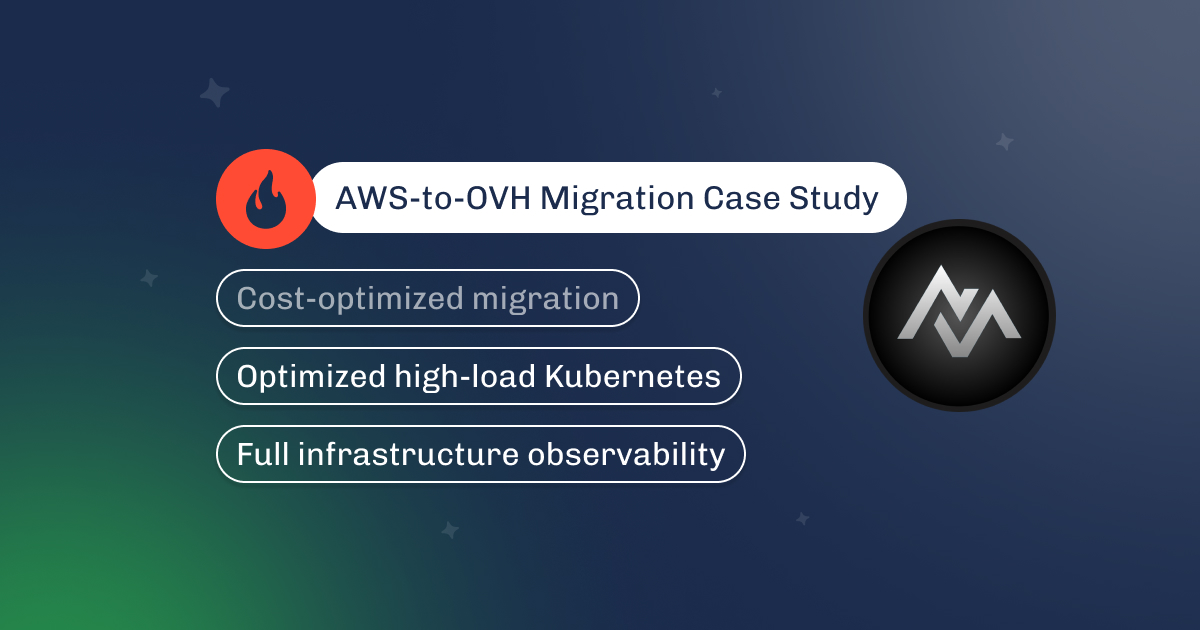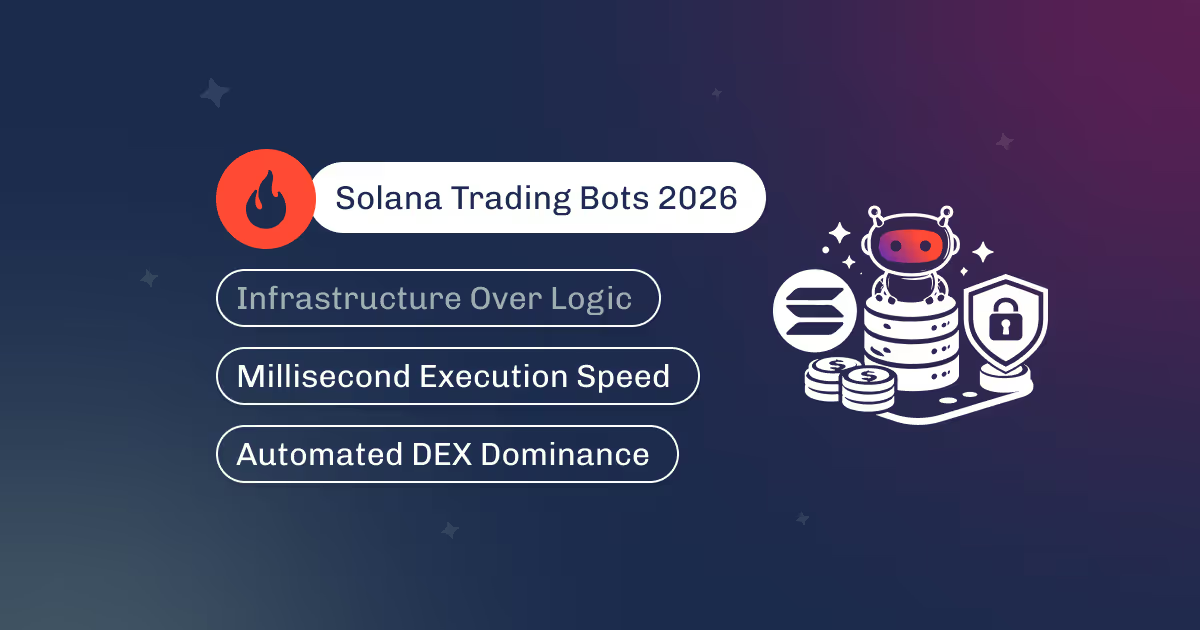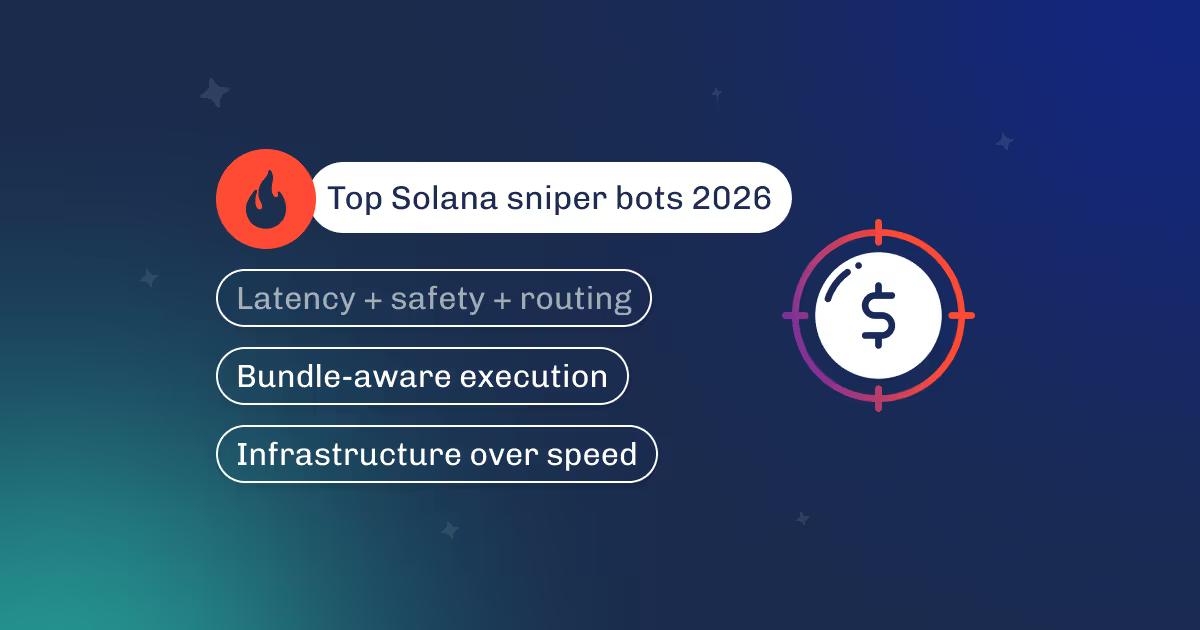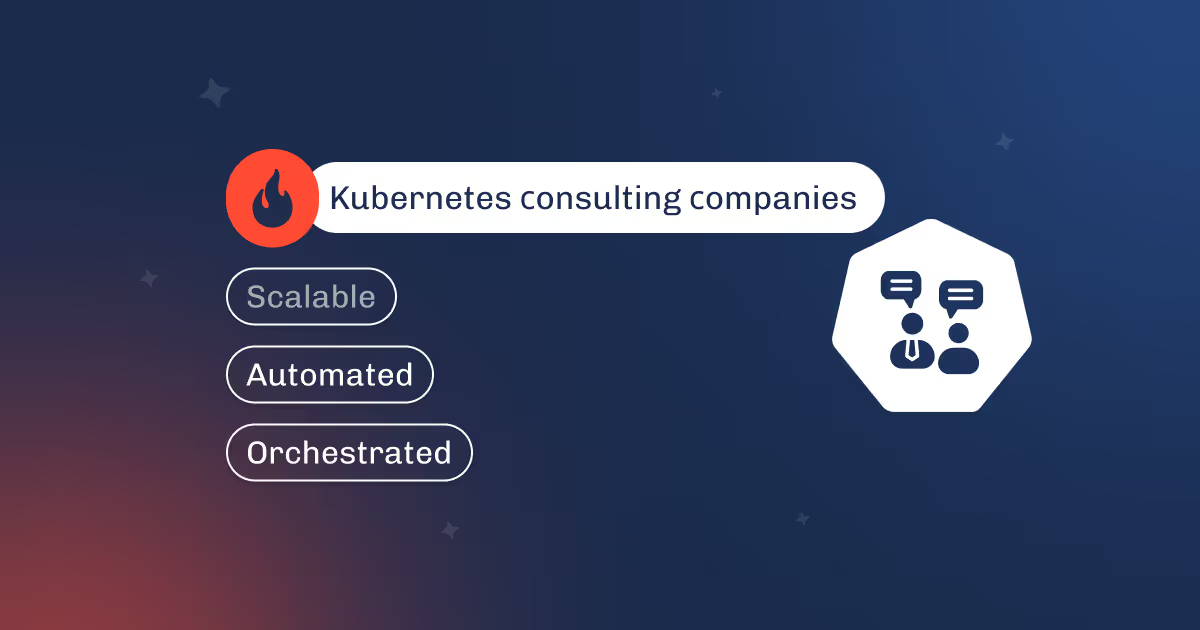
Picture this: Your Kubernetes cluster is humming along one minute, then bam—downtime hits because of a sneaky misconfiguration, scaling issues eat into your budget, or security gaps leave you exposed.
We've seen it all at our firm, wrestling with these beasts daily to help teams like yours avoid the pitfalls. But in 2025, you don't have to go it alone. We're spotlighting the top consulting firms that specialize in turning Kubernetes headaches into streamlined successes, from slashing costs by up to 5x to building unbreakable hybrid setups.
And yes, Dysnix is right there in the mix, with our senior experts delivering instant value through audits, migrations, and optimizations that have saved clients millions.
At our firm, we've watched Kubernetes evolve from a niche tool into the backbone of modern cloud-native operations, but let's be real—it's not all smooth sailing.
Kubernetes, or K8s as we like to call it, is an open-source platform that automates the deployment, scaling, and management of containerized applications.

Think of it as the conductor of a massive orchestra, where each "musician" is a microservice running in a container like Docker. Consulting in this space means bringing in experts who handle everything from initial audits to ongoing optimizations, ensuring your setup doesn't just work but thrives under pressure.
In 2025, with the global Kubernetes market projected to grow from $1.7 billion in 2023 to $11.78 billion by 2032 at a CAGR of around 23.4%, businesses are diving in headfirst. But without guidance, you're risking costly missteps in a landscape riddled with AI demands, edge computing, and relentless cyber threats.
The truth is, Kubernetes solves big problems but creates its own headaches if not handled right. We've seen teams grapple with skyrocketing costs—42% of CIOs and CTOs cite cloud waste as their biggest challenge, with many reporting year-over-year increases in Kubernetes expenses due to overprovisioning and inefficient resource allocation. Then there's the skills gap: only about 5.6 million developers worldwide are actively using K8s, leaving many companies scrambling for talent amid complex setups.
Security is another beast; in 2025, vulnerabilities like unauthorized access and misconfigured RBAC (Role-Based Access Control) are rampant, especially as AI workloads multiply and expose new attack vectors, with 37% of organizations admitting they've delayed security updates due to resource limitations. Multi-cloud and hybrid strategies add layers of complexity, where networking issues with service meshes like Istio or observability tools such as Prometheus can lead to downtime that costs enterprises an average of $300,000 per hour. And don't get us started on common pitfalls like CrashLoopBackOff errors, where pods keep restarting due to bad configurations, or pending pods stuck in scheduling limbo because of node taints and tolerations gone wrong.
But here's where Kubernetes consulting flips the script and turns these challenges into opportunities. We help businesses implement autoscaling with Horizontal Pod Autoscalers (HPA) to dynamically adjust resources, slashing costs by up to 70% through FinOps practices that optimize cloud spend.
For instance, in a real-world case, Xbox Cloud Gaming used Kubernetes with a service mesh to handle massive traffic, reducing latency by 100ms on average via mTLS optimizations.
Another example: a fintech firm migrated to Amazon EKS, boosting their deployment speed by 4x while embedding security features like secret management with Vault to comply with regulations. Сonsultants dive into audits that uncover hidden inefficiencies, design architectures for resilience (think self-healing pods and zero-downtime updates), and provide training to upskill the team.
Startups scaling rapidly in AI or blockchain, where Kubernetes enables seamless microservices for apps like real-time data processing; enterprises in regulated industries like finance and healthcare, tackling compliance and data sovereignty in hybrid clouds; and even e-commerce giants managing seasonal spikes without breaking the bank.
To break it down, here are some of the top problems Kubernetes consulting tackles head-on in 2025:
So, if your business deals with high-traffic apps, DevOps bottlenecks, or the push toward serverless with tools like Knative, consulting is your shortcut to avoiding the risks where organizations have reduced publicly exposed pods with severe vulnerabilities by 50% through better practices.
Now that we've unpacked the wild world of Kubernetes challenges, let's jump into the best companies. We've handpicked these top firms based on their real-world impact, innovative edges, and client wins, starting with us at Dysnix.
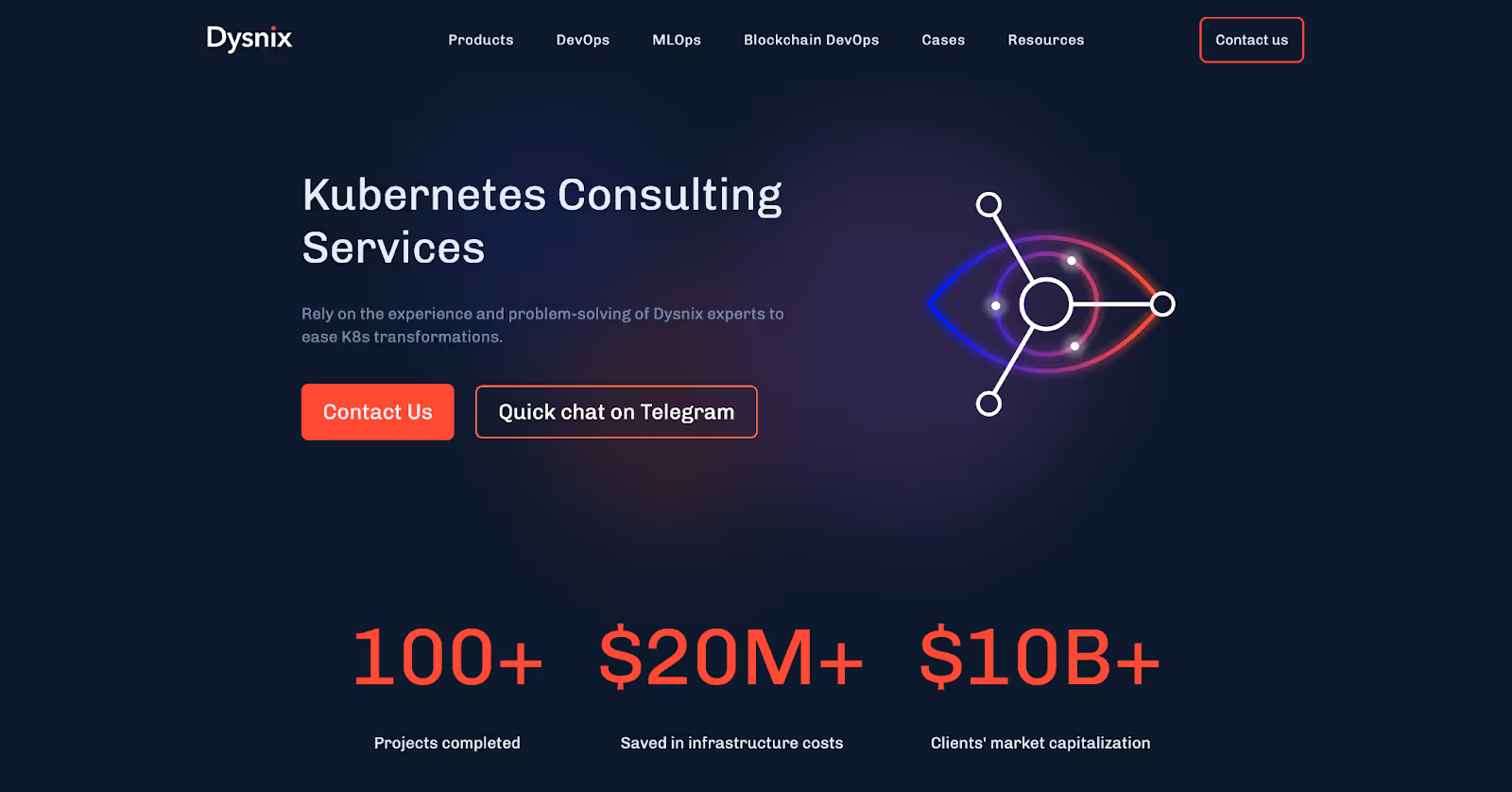
At Dysnix, we lead the pack in Kubernetes consulting by focusing on high-impact, customized solutions that drive real business value. With over 100 projects under our belt, we've saved clients more than $20 million in infrastructure costs while supporting companies with a combined market capitalization exceeding $10 billion.
Our approach is all about delivering instant value through senior-level expertise, ensuring your Kubernetes setup isn't just functional but optimized for speed, security, and scalability.
Take our work with Wand.ai, for example: We conducted thorough research into their R&D workflow processing ML models, selected the best tools, developed various iterations, and pushed their project from the ground up.
The result? A completed plan for development and execution phases, internal knowledge transfer, and full team buy-in for implementation.
In 2025, as AI and blockchain workloads surge, we're the go-to for teams needing future-proof designs that cut costs by up to 5x without compromising on reliability.
Key services:
Unique features:
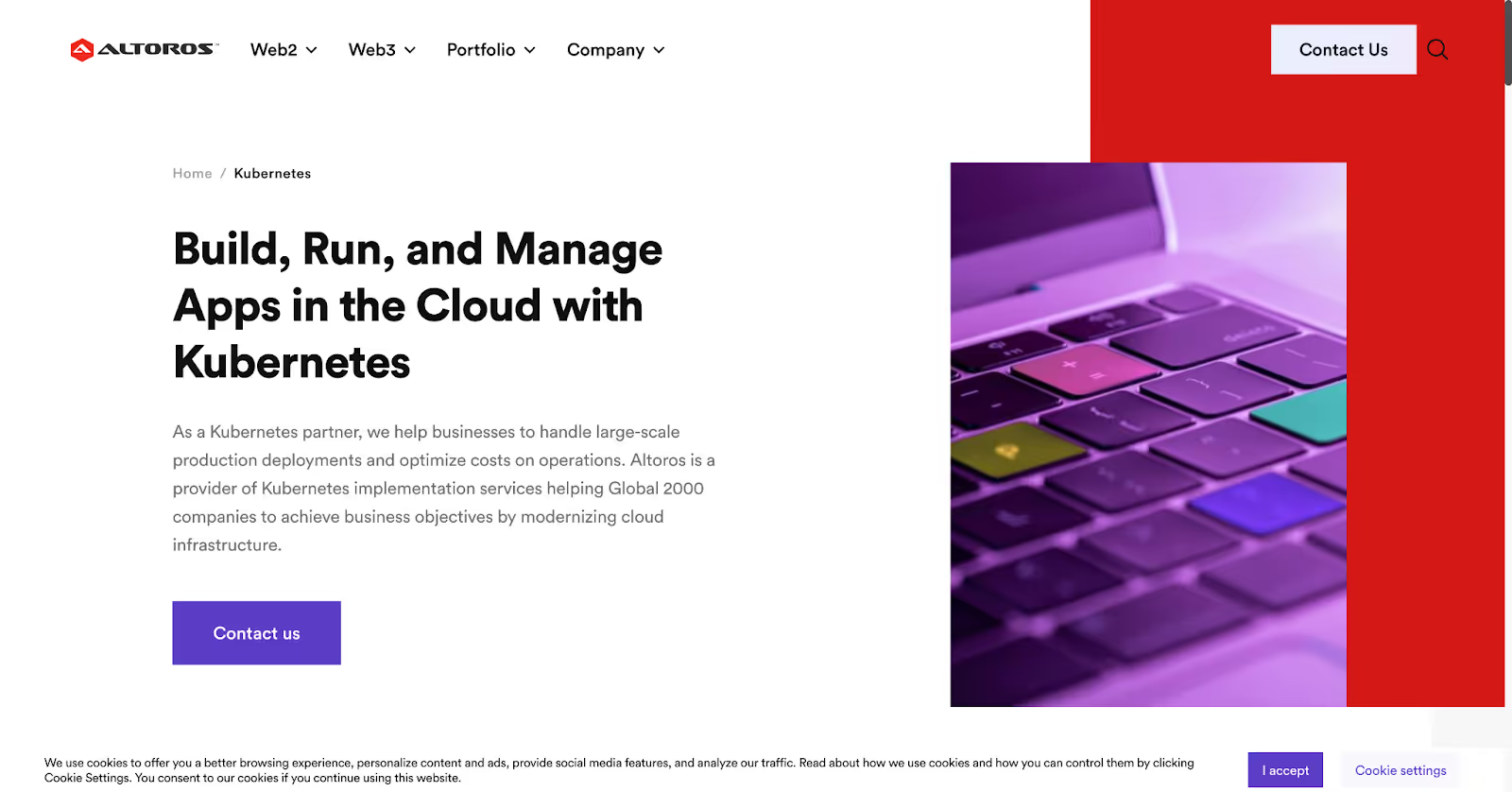
Following Dysnix's boutique focus, Altoros brings a broader, enterprise-grade lens to Kubernetes consulting, drawing on decades of experience in cloud-native technologies.
They excel in helping organizations navigate complex environments, from on-premises to edge deployments, with a strong emphasis on security and compliance. In 2025, as hybrid clouds become the norm, Altoros stands out for their vendor-agnostic advice, ensuring clients maximize benefits while minimizing risks like vulnerabilities in AI-integrated setups.
Their services cover the full lifecycle, empowering teams to handle Kubernetes independently long-term, which is crucial in a year where skills shortages persist.
Key services:
Unique features:

Building on Altoros's comprehensive scope, MeteorOps takes a more agile, on-demand approach, connecting you with the top 0.7% of Kubernetes specialists for flexible, pay-as-you-go consulting. This makes them ideal for startups and fast-scaling teams in 2025, where AI-driven workloads demand quick adaptations without full-time hires.
We've seen them shine in hands-on implementations, from cluster provisioning to advanced ML orchestration, with free consultations kicking off projects seamlessly. Client stories, like Erisyon's error-free AWS changes or Taranis's integral DevOps support, highlight their speed in delivering high-availability setups.
Key services:
Unique features:

Shifting from MeteorOps's agility, RX-M emphasizes vendor-neutral, open-source-centric consulting to bridge digital transformation gaps, making them a solid choice for teams new to Kubernetes in 2025. Their focus on proof-of-concepts and CI/CD integrations helps organizations experiment safely amid rising complexity from edge computing. With a proprietary 128-point checklist for platform design, they ensure thorough risk management, supporting languages like Go and Java alongside tools like Prometheus for observability.
Key services:
Unique features:
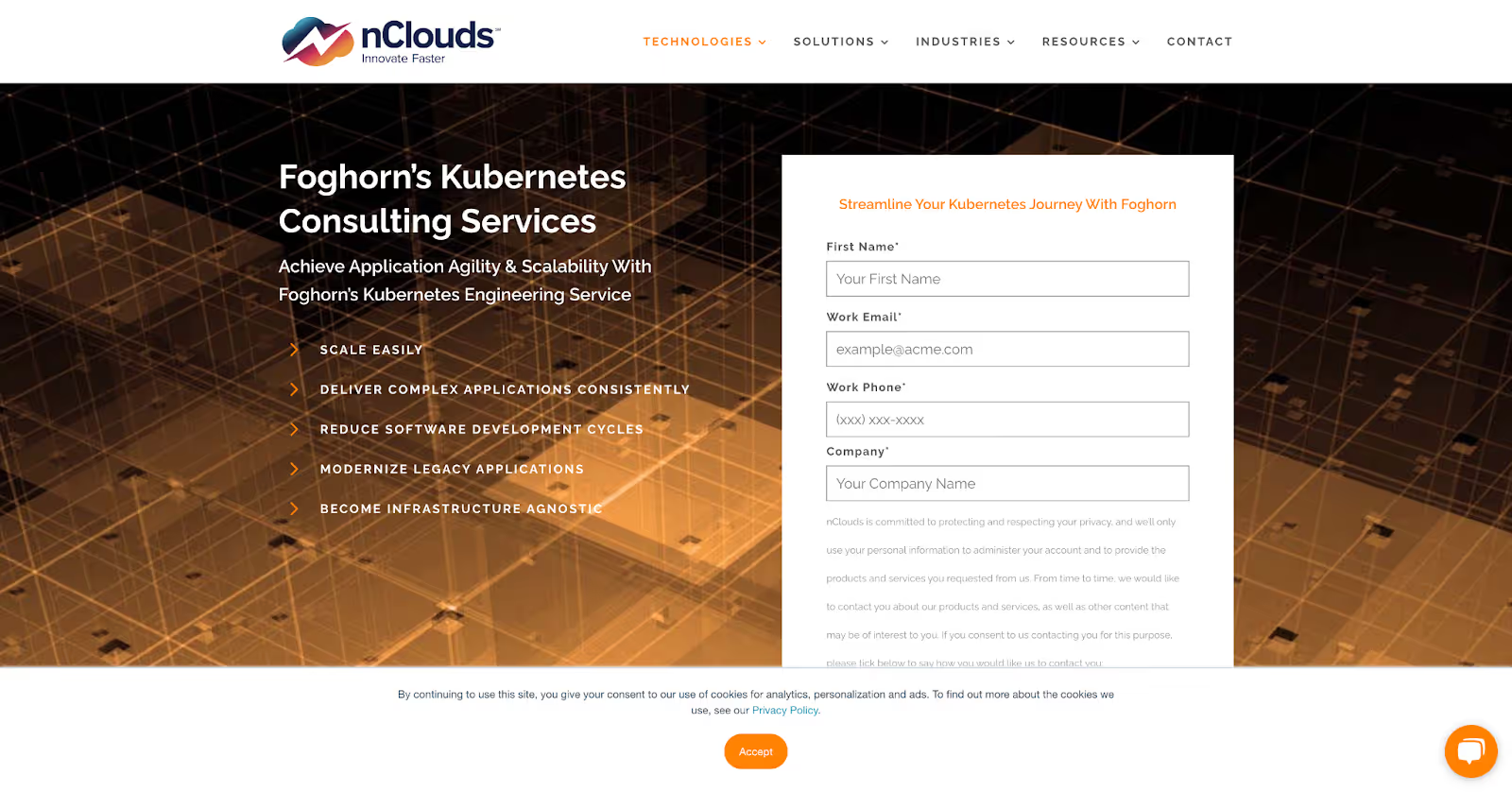
Rounding out our list, Foghorn Consulting prioritizes engineering precision for Kubernetes, leveraging a library of prebuilt IaC to speed up deployments—perfect for 2025's focus on application modernization in hybrid setups.
Their open-source, infrastructure-agnostic stance allows flexible scaling, automating processes to cut manual errors. While they support all journey stages, their strength lies in resource prioritization and storage management, enabling efficient handling of persistent data in high-demand scenarios.
Key services:
Unique features:
There you have it—our rundown of the top Kubernetes consulting firms lighting up 2025, each with their own flair for turning cluster chaos into smooth operations.
From Dysnix's laser-focused, cost-slashing expertise to the broad strokes of Altoros and the agile sprints of MeteorOps, these players prove there's no one-size-fits-all in the K8s world.
But if we're being honest (and a tad biased, since we're in the game), the real magic happens when you pair deep tech know-how with a genuine understanding of your business pains. Like we've done for clients in AI, fintech, and beyond, saving them millions and headaches along the way.
Let's audit your setup, blueprint a future-proof plan, and get you deploying like a pro. Who knows? Your next big win could be just one conversation away.






